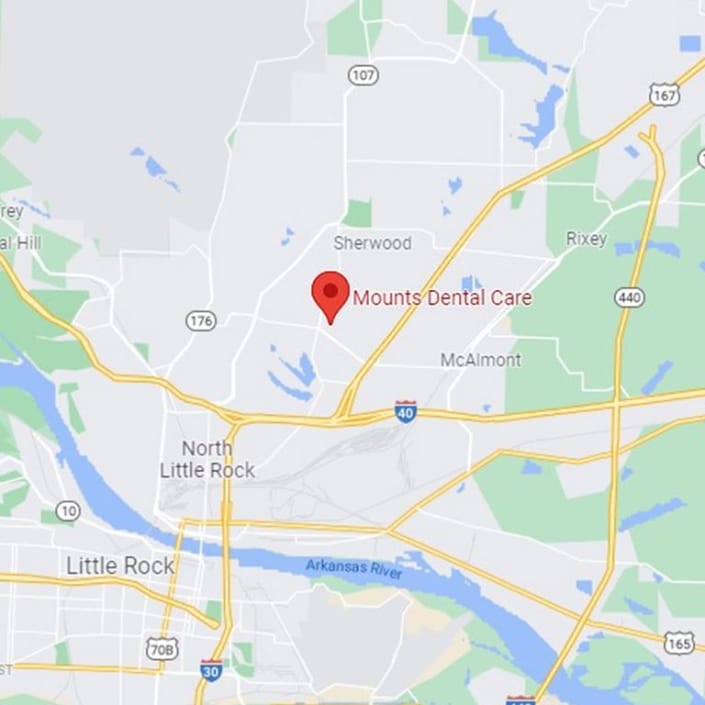TMJ Treatment in North Little Rock, AR
TMJ is an acronym that stands for Temporomandibular Joint, which is the joint that attaches your jaw bone to your skull. Disorders with this joint can come from misalignment of the teeth or jaw, arthritis, clenching, grinding, or trauma. Symptoms may include:
- Fatigue when chewing
- Pain opening wide
- Tension headaches
- Migraines
- Discomfort in cheeks where muscle is located
- Pain by the ear
- Clicking or popping that causes pain or discomfort
- Locking of joint
In most cases pain and discomfort can be alleviated and controlled without surgery. At Mounts Dental Care, our TMJ disorder treatment plans are designed specifically for our patients. Recommendations could include massage therapy, chiropractic care, dental splint, or Xeomin treatment. Botox and Xeomin have been found to be a great treatment for TMJ disorders that relate more to the muscle. Treatment helps knotted muscles to relax, relieving muscle tension and pain. For your personalized TMJ consult, call our office to schedule an appointment!
TMJ Causes
Many things can cause TMJ. For some patients, TMJ may be caused by a combination of several things happening at once. Some examples of the type of reasons that a person may experience TMJ include:
- Jaw injury. A person who dislocates their jaw or who breaks their jaw in an accident may experience TMJ following the healing process.
- Arthritis. The jaw is a joint that can experience arthritis like other joints. Arthritis can lead to TMJ for some people.
- Bruxism. Bruxism is a condition that can lead to teeth grinding at night while sleeping or even during the day while awake. Bruxism can cause various dental problems, including TMD and broken or damaged tooth enamel.
- Stress. For some people, stress can lead to TMJ. This may happen because they grind their teeth or clamp their teeth closed.
- Misalignment of the jaw. If your teeth don’t fit together as they should, you could experience TMD, among other problems.
Who Is At Risk for TMJ?
You may be at risk for TMJ if you have arthritis, have broken your jaw, or if you grind your teeth at night. You may worsen your condition if you chew on gum frequently, sleep on your stomach, chew on pens or pencils as a habit, or if you frequently use your teeth as scissors.
TMJ Treatment at Mounts Dental Care
There are many things that your dentist at Mounts Dental Care can do to treat your TMJ. Some examples of the kind of treatment you can expect for this condition include:
- Medication to alleviate pain, relax your muscles, or change teeth-grinding behaviors.
- Use a mouth guard to protect your teeth from grinding, and also place your jaw in a position so it is less likely to engage in grinding.
- Physical therapy to make changes to the jaw joint.
- Coaching through behavioral changes. For example, if you bite pens or chew ice, then your dentist can help you find alternative behaviors and identify problematic behaviors that could be causing TMJ.
The treatment that your dentist recommends for TMJ will depend on the causes that your dentist identifies for your TMJ. Remember that it’s not always clear what is causing TMJ, so your dentist may need to recommend various solutions before settling on the right solution for your problem.
Why Patients Choose Mounts Dental Care
Patients choose Mounts Dental Care for TMJ treatment because our dental professionals are skilled and experienced in the treatment of jaw conditions. We offer excellent patient care and do our work with the professionalism that our patients expect. When you come to Mounts Dental Care for TMJ treatment, this is what you can expect from the experience:
- Streamlined, convenient scheduling process
- Modern, state-of-the-art facilities with the latest dental equipment required to treat your condition
- Appointment is efficient, and our dental professionals treat you with the utmost care
Want to find out why patients come to Mounts Dental Care? Come to our office to see for yourself.
Need TMJ Treatment? Contact Us
Do you need TMJ treatment? Your dentist in North Little Rock, AR, can help. At Mounts Dental Care, we provide TMJ treatment to patients to help them avoid the pain and discomfort from temporomandibular joint disorder. We offer a range of treatments and can help you determine the cause of your pain.
Don’t live with the discomfort associated with TMJ. With treatment, your TMJ can improve. Left alone, TMJ can become more problematic over time and may even lead to problems eating or speaking. Call today to make an appointment and meet with one of our qualified dental professionals.

